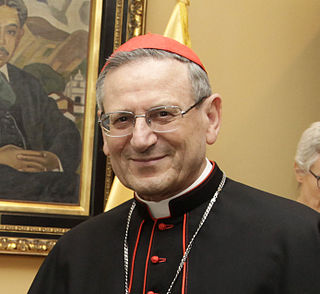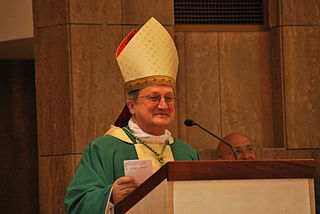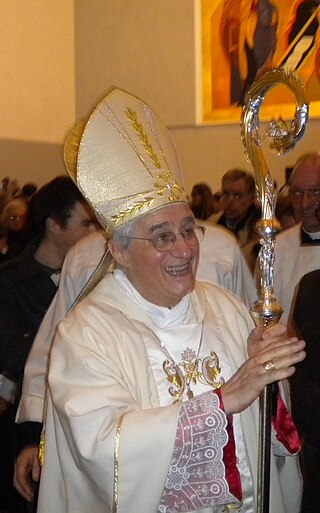Related Research Articles

Álvaro del Portillo y Diez de Sollano was a Spanish engineer and Roman Catholic bishop. He served as the prelate of Opus Dei between 1982 and 1994 as the successor to Josemaría Escrivá.

Marcelo Sánchez Sorondo is an Argentine prelate of the Catholic Church who was Chancellor of the Pontifical Academy of Sciences and the Pontifical Academy of Social Sciences from 1998 to 2022. He was made a bishop in 2001. Having authored many publications in the sciences, he received several honors, including the Légion d’Honneur of France in 2000.

Fernando Ocáriz Braña is a priest of the Catholic Church who has been the prelate of Opus Dei since 2017. Ocáriz is the fourth person to head Opus Dei since its founding in 1928. He is widely published in philosophy and has been a consultor of the Congregation for the Doctrine of the Faith since 1986.

Gabriel Maria Roschini, OSM, was a Roman Catholic Italian priest and professor of Mariology, who published over 900 titles on the subject. During the pontificate of Pope Pius XII, he worked closely with the Vatican on Marian publications.
Franco Manzi is an Italian Catholic priest and academic.

Raimondo Spiazzi OP was an Italian Catholic theologian, advisor to Pius XII, and Mariologist with over 2,500 publications.

Angelo Amato, S.D.B. is an Italian cardinal of the Catholic Church who served as the Prefect of the Congregation for the Causes of Saints between 2008 and 2018. He served as Secretary of the Congregation for the Doctrine of the Faith from 2002 to 2008 and became a cardinal in 2010.
Antonio Añoveros Ataún (1909–1987) was a Spanish Roman Catholic priest. He is known mostly as a protagonist of the so-called "Añoveros case", a 1974 episode which marked the gravest crisis in relations between Francoist Spain and the Church. Though during the Civil War he joined Carlists, he is recognized chiefly as one of the most liberal members of the Spanish hierarchy during the late Francoism; he is appreciated especially in the Basque realm.

Juan José Tamayo is a Spanish theologian and professor of theology at the Charles III University of Madrid. He specializes in Catholic hierarchy but has broadened into Islamic studies. He has contributed to controversies about Opus Dei, and has written over 50 books. He is president of the Asociación de Teólogos Juan XXIII.

Livio Melina is a priest of the Catholic Church and an Italian theologian.

Pedro Pacheco de Villena, also known as Pedro Pacheco Ladrón de Guevara, was a Spanish cardinal and viceroy of Naples. In Italian his name is spelled Pietro Pacecco. His nephew Francisco Pacheco de Toledo was also a cardinal.

Enrico dal Covolo SDB is a Catholic bishop and Italian theologian, Assessor of the Pontifical Committee for Historical Sciences from 15 January 2019. He previously served as the rector of the Pontifical Lateran University from his appointment on 30 June 2010 until 2 June 2018. In addition he was also the postulator of the cause of canonization of Pope John Paul I from 2003 until 2016.

Gianni Ambrosio is the emeritus bishop of the Roman Catholic Diocese of Piacenza-Bobbio.

Lluis Clavell Ortiz-Repiso is a Roman Catholic priest.

José María Vigil is a Latin American theologian who has played a significant role in the fields of liberation theology and spirituality, the theology of religious pluralism and the emergence of new paradigms. He has been a Claretian missionary since 1964 and a Catholic priest since 1971. He is a naturalised Nicaraguan and currently lives in Panama. He is known for his numerous writings, his editorial and online activity, his service to the Association of Theologians of the Third World (EATWOT), the coordination of Koinonia Services and the International Latin American Agenda, his theology of religious pluralism and, in recent years, his contributions to a ”new paradigms” theological perspective.

Traditionalism is a Spanish political doctrine formulated in the early 19th century. It understands politics as implementing the social kingship of Jesus Christ, with Catholicism as the state religion and Catholic religious criteria regulating public morality and every legal aspect of Spain. In practical terms it advocates a loosely organized monarchy combined with strong royal powers, with some checks and balances provided by organicist representation, and with society structured on a corporative basis. Traditionalism is an ultra-reactionary doctrine; it rejects concepts such as democracy, human rights, constitution, universal suffrage, sovereignty of the people, division of powers, religious liberty, freedom of speech, freedom of commerce, equality of individuals, parliamentarism and so on. The doctrine was adopted as the theoretical platform of the Carlist socio-political movement, though it appeared also in a non-Carlist incarnation. Traditionalism has never exercised major influence among the Spanish governmental strata, yet periodically it was capable of mass mobilization and at times partially filtered into the ruling practice.
Gladys Ethel Parentelli Manzino is a Uruguayan feminist theologian and photographer who has lived in Venezuela since 1969. A representative of Latin American ecofeminism, she was one of three Latin American women appointed by Pope Paul VI as observers at the Second Vatican Council.

Francisco Canals Vidal (1922–2009) was a Spanish philosopher, theologian, academic and lay Catholic activist. The longtime chair of Catedra de Metafísica of the Barcelona University, he is recognized mostly as one of the most distinguished contemporary Thomists and leader of the so-called Barcelona Thomist school; his scientific focus was mostly on metaphysics of cognition. As a theologian he specialized in theology of history and Josephology, as lay Catholic he contributed to devotion to the Sacred Heart of Jesus. Historian of ideas and partially political theorist himself, he remained related to the Carlist version of Traditionalism and is considered one of its greatest contemporary masters.

Carlos Gustavo Castillo Mattasoglio is Peruvian prelate of the Catholic Church whom Pope Francis named Archbishop of Lima on 25 January 2019.

Onésimo Díaz Hernández is a Spanish historian known for his publications regarding the history of Spain in the twentieth century.
References
- ↑ ""La persona al centro del Magistero sociale della Chiesa". Pubblicato un libro in onore del Prof. Enrique Colom. : News dell'Osservatorio" (in Italian). Retrieved 2021-01-15.
- ↑ "Docenti del Dipartimento di Teologia Morale | Pontificia Università della Santa Croce". www.pusc.it. Retrieved 2021-01-15.
- ↑ "The World Seen From Rome". 2007-10-04. Archived from the original on 2007-10-04. Retrieved 2021-01-15.
- ↑ "Auguri affettuosi al professor Enrique Colom. : News dell'Osservatorio" (in Italian). Retrieved 2021-01-15.
- ↑ "Padre Enrique Colom". Universidad de los Andes (in Spanish). Retrieved 2021-01-15.